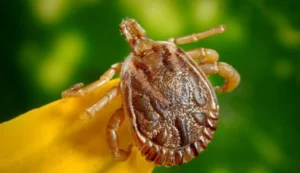Identifying the Tick
When you find a tick in your house, the first step is to identify its species. Take a clear photo and consult a medical professional or pest control expert if you’re unsure.
Removing the Tick
Use tweezers or a tick removal tool to gently grasp the tick close to the skin and pull it out. Avoid squeezing or twisting the tick to prevent the head from breaking off.
Proper Disposal
Dispose of the tick in a sealed plastic bag and discard it in your outdoor garbage bin. Avoid crushing the tick with your fingers to prevent the release of disease-causing pathogens.

Cleaning the Area
Thoroughly clean the area where the tick was found with soap and water. Disinfect the area using rubbing alcohol or hydrogen peroxide to prevent infection or disease transmission.
Checking for Other Ticks
Inspect your home, including carpets, bedding, and furniture, for any other ticks. Don’t forget to check your pets too using a fine-toothed comb.
Preventing Future Infestations
To prevent future tick infestations, keep your home clean, seal cracks or gaps, use tick repellent on pets, and regularly check pets and family members for ticks after outdoor activities.

Understanding the RisksTicks can transmit diseases such as Lyme disease, Rocky Mountain spotted fever, and tularemia. Seek medical attention if you or a family member develop symptoms after a tick bite.
Taking Action
Finding a tick in your home can be alarming, but by following these steps, you can protect your family and pets from harm and reduce the risk of tick-borne diseases. Stay calm, act swiftly, and prioritize prevention measures for a tick-free home.





